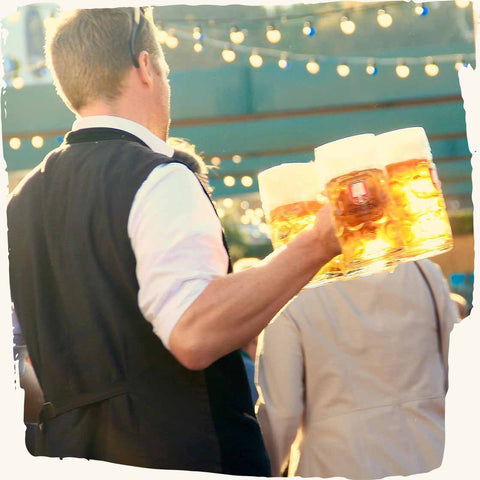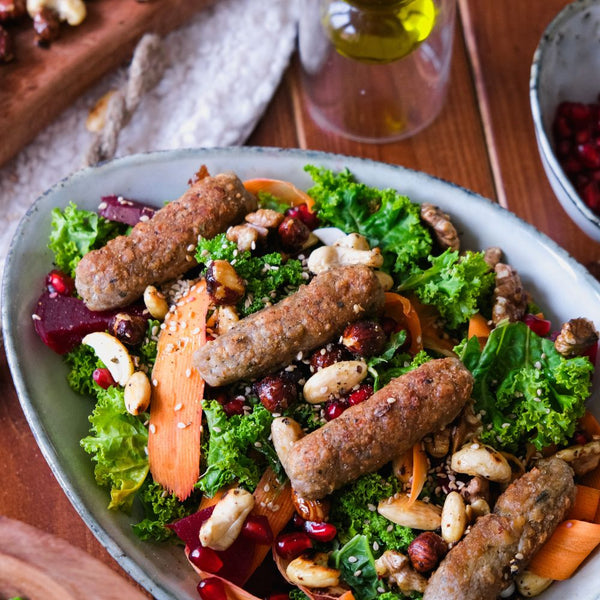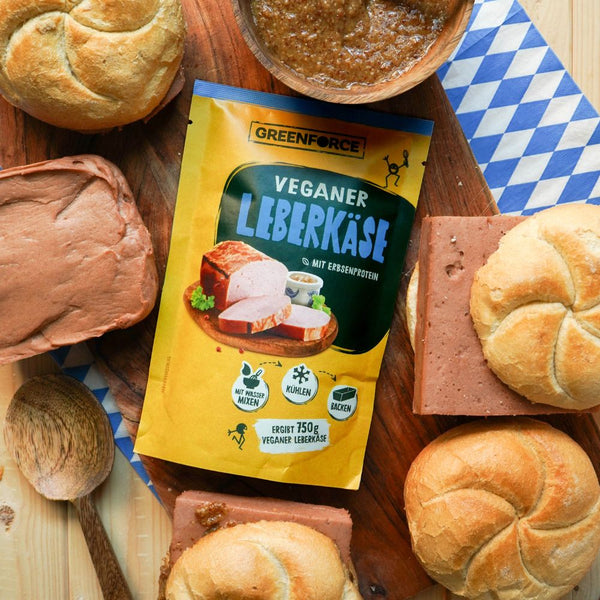Are you eager to get out your traditional costume again, dress up and celebrate on the beer benches in Munich? Well, then you're in luck! Very soon it will be said again: O'zapft is!
Last year it was clear that the popularity of Oktoberfest has not decreased despite the two-year Corona break: around 5.7 million visitors braved the mixed weather in 2022. Compared to 2019, there were around 500 thousand fewer, but both the weather and the still rather vague pandemic situation are not innocent.
As in previous years, over 6 million visitors are expected from September 16th to October 3rd, coming from all over the world to take part in this classic Bavarian highlight of the year. But this year, what is particularly important is how we can celebrate the Oktoberfest as sustainably as possible. We are also represented at the Oktoberfest with some vegan delicacies .
Let's find out a little more about Oktoberfest: When and why did the festival come about? How much has it grown over history? And, what is particularly important to us: How can we celebrate the annual growth in Oktoberfest popularity, have a good time at the festival and leave the smallest possible ecological footprint ? Wow, that sounds like a challenge.
Oktoberfest: a popular tradition
The origins of the Oktoberfest tradition can be traced back to the wedding of King Ludwig I and Princess Therese in 1810. There was a lot of celebration here in the city and on the Theresienwiese (the 'Wiesn'), which was named in honor of the bride Therese.
Since then, this celebration has become a huge festival that attracts visitors from all over the world every year.
At Oktoberfest there is a lot of celebration - with everything that goes with it. Drinking, eating, singing along to folk and pop music and having a lot of fun with friends and new acquaintances, that's just part of it.
THE CONTINUING GROWTH OF O KTOBERFEST – CAN IT CONTINUE TO GROW?
It is not difficult to understand how the Oktoberfest was able to develop into a real consumer stronghold. According to a report from the city of Munich, almost 8 million liters of beer were drunk and over 400,000 roast chickens, 130 oxen and 80 whole calves were eaten in 2018. The average price of a measure back then was already over 11 euros and has climbed significantly again this year: for a measure this year you can dig a little deeper into your wallet at a price between 12.60 and 14.90 euros .
While most Oktoberfest visitors come from Bavaria, Oktoberfest also attracts many tourists from all over the world thanks to its worldwide fame. According to Blick.ch , a full 14% of visitors came from abroad in 2017, a large proportion of which came from neighboring countries such as Italy and the Netherlands.


The tourist aspect of Oktoberfest always boosts the local economy - according to the Oktoberfest's official website, around 802 million euros were spent in the city by out-of-town festival guests in 2019. That's quite a sum.
The worldwide recognition and celebration of Bavarian culture is of course great. However, it must also be noted that this high proportion of specially arriving visitors means that significantly more CO2 is produced during the Oktoberfest due to flight arrivals and departures .
For American Oktoberfest tourists from Los Angeles, for example, the CO2 calculator from myclimate.org estimates that the CO2 emissions of the one-off flight route Los Angeles - Munich are 3.2 tons per person .
In order not to further accelerate climate change, individuals should produce less than 0.6 tons of CO2 annually. The outward and return journey of the Oktoberfest holiday alone exceeds this limit by more than ten times the emissions for travelers from Los Angeles.
A STEP TOWARDS MORE SUSTAINABILITY AT THE WIESN
As Oktoberfest becomes more popular worldwide, new, sustainable practices are needed. This is exactly where GREENFORCE comes into play!
When you think of the Oktoberfest, the aforementioned high meat consumption immediately comes to mind. For a long time it was difficult to find any vegetarian dishes on the menus. But in recent years it has become easier for visitors who want to eat less or no meat at all.
In fact, there are also traditional dishes in Bavaria that are naturally served without meat. These include cheese spaetzle or cream mushrooms. What's new since 2022 is that we are represented with the exciting vegan white sausage from GREENFORCE - and even better in 2023: many more vegan GREENFORCE delicacies, like our Leberkäse! Find us in the Käfer tent, Hofbräu tent, and many others. Hearty enjoyment - vegan and without any animal suffering.🌱
Green electricity and climate neutrality at Oktoberfest?
Did you know that the Oktoberfest was completely without electricity until 1866? That is probably unimaginable today.
After all, the Oktoberfest has also been powered by green electricity since 2012 , which saves 1,000 tons of CO2 annually, according to the Oktoberfest's official website. Over 60 percent of the feeders use the “ M-Ökoaktiv ” offer from the Münchner Stadtwerke.
Some tents, such as the Hofbräu tent, are completely climate-neutral . They offset their emissions by investing in domestic climate protection projects.
Landlords also take other measures to make their tents particularly sustainable: in the Süddeutsche Zeitung, the landlady of the Paulaner tent, Arabella Schörghuber, explains how they are aiming for climate neutrality with the help of vegan currywurst, organic pretzels and a sustainability project financed with compensation payments strives for organic certification.
The question of waste remains very important for the sustainability of the Oktoberfest - especially in view of the high consumption during this time. But we can be happy that the huge amounts of food and drinks consumed at the Oktoberfest have been enjoyed almost exclusively with reusable cutlery and crockery since 1991! An article in the Süddeutsche Zeitung published in 2018 shows how this measure alone has helped to significantly reduce the overall amount of waste at the Oktoberfest.
Nevertheless, around 1,160 tons of waste are produced at the Oktoberfest every year, although this number does not even include the additional 500 tons of leftover food. However, with the help of the ecological measures already taken and future ones, we can hope that this number will continue to decrease over the next few years.


CELEBRATE WITHOUT LIMITS: vegan Oktoberfest recipes for at home and everywhere
Enjoy the heartiest vegan Oktoberfest delicacies - whether in Munich, Hamburg, Berlin or somewhere else - We got you! Here we have prepared a great range of vegan Oktoberfest recipes so that you can bring the Oktoberfest feeling home - or wherever you want.
-
Vegan breakfast white sausage roll:
What better way to start the day? A slightly more unusual recipe is our breakfast roll with our vegan white sausage and vegan egg. Of course, sweet mustard should not be missing here either. We also top the roll with lamb's lettuce, radishes and delicious fried onions. Heavenly. To the recipe. -
Bavarian burger with sweet mustard:
With this burger you bring a piece of Bavaria home. Sweet mustard, radishes and coleslaw on a delicious pretzel roll make the hearts of Oktoberfest fans beat faster. To the recipe. -
Bavarian sausage-salad:
Sausage salad is probably one of the absolute classics of Bavarian cuisine. Super quick to prepare, spicy and...vegan!. We use the vegan mini wieners, cucumbers, radishes and peppers. Fresh chives and walnuts round off the salad. To the recipe .
Try it out now!

















